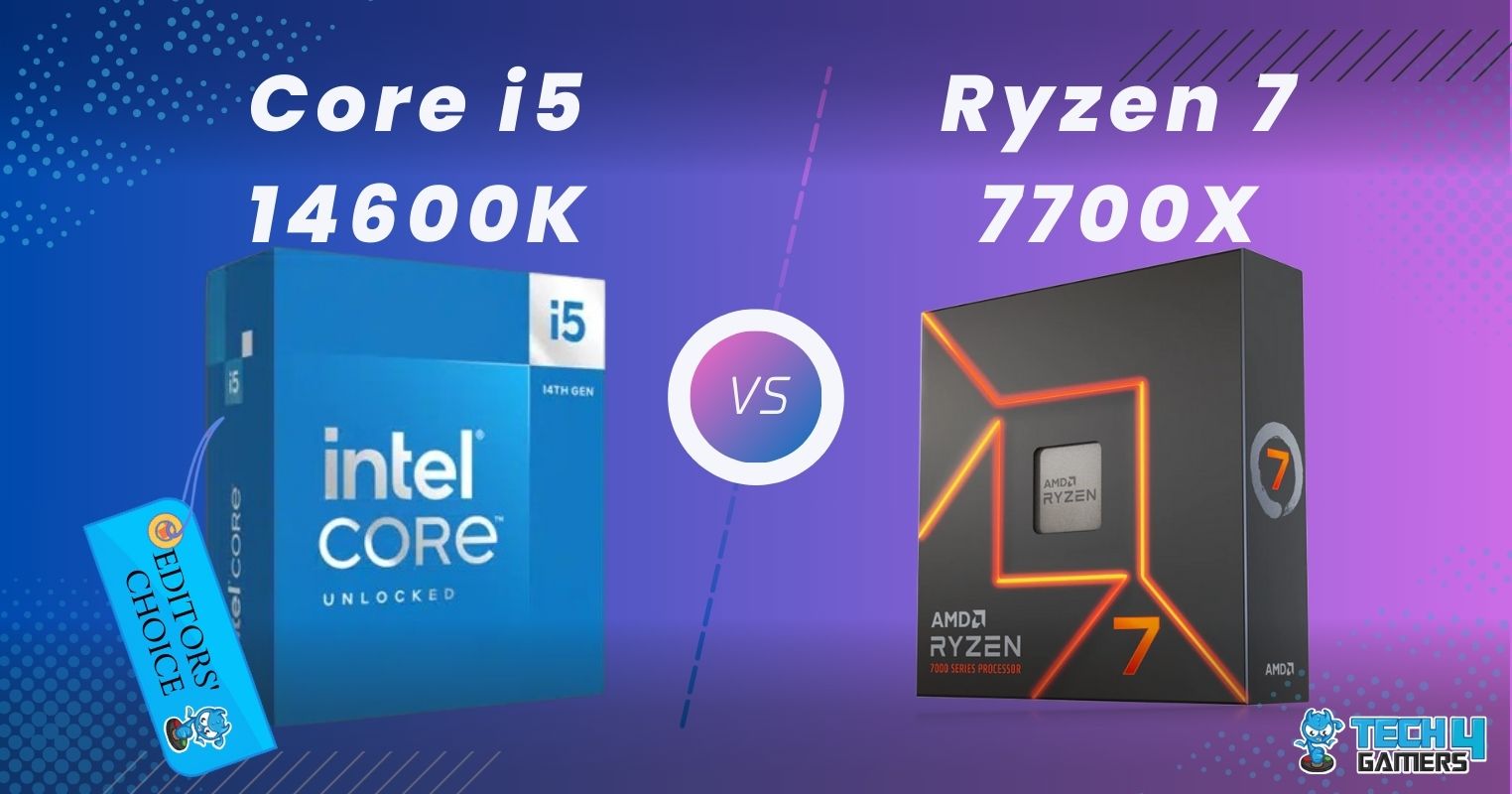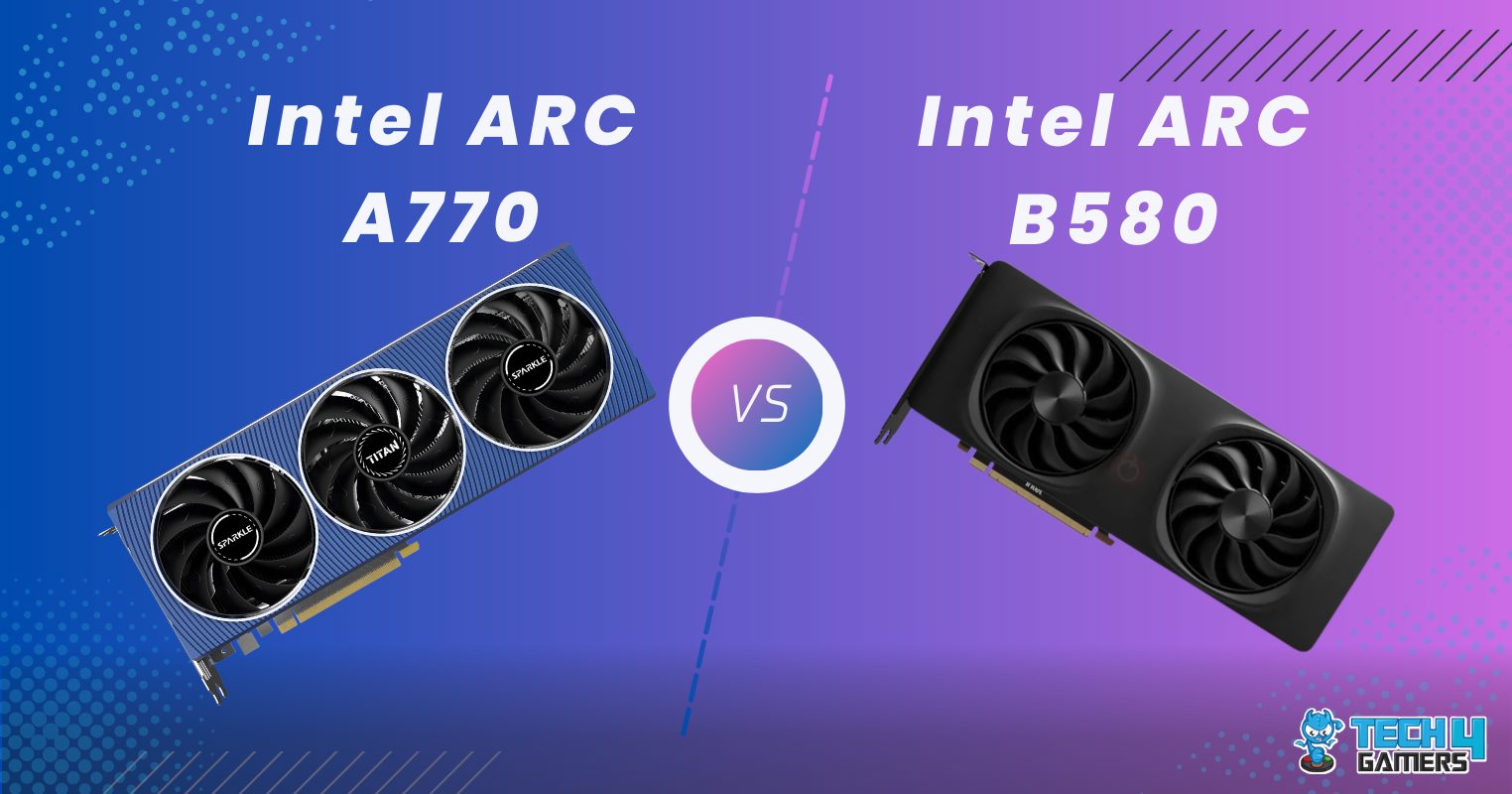Intel Core i5 14600K
Rated: 8.5/10
AMD Ryzen 7 7700X
Rated: 8/10
Pros & Cons
| CPU | Pros | Cons |
|---|---|---|
| Ryzen 7 7700X | ✅Better power efficiency ✅Longer upgrade path | ❌Slightly lower performance ❌Higher platform cost |
| Core i5 14600K | ✅Lower platform cost ✅Lower processor cost | ❌Very old manufacuring process ❌High power draw |
Key Takeaways
- In our gaming tests at 1080p, the Core i5 had better averages, but it lost the same margin in terms of 1% lows.
- The Core i5 14600K drew about 9% more power than the Ryzen 7 7700X in our tests.
- The Ryzen 7 7700X was around $20 more expensive than the Core i5 14600K as of late December 2023.
- AMD offers a more modern, power-efficient processor, while the Intel processor is better for people on a slightly tighter budget.
Specification Table
| Feature | Intel Core i7-14600K | AMD Ryzen 7 7700X |
|---|---|---|
| Processor Base Power | 125 W | 105W |
| Memory Types | Up to DDR5 5600 MT/s Up to DDR4 3200 MT/s | Up to DDR5 5200MT/s |
| Max Memory Size | 192 GB | 128 GB |
| Max Memory Bandwidth | 89.6 GB/s | 83.2 GB/s |
| Max # of Memory Channels | 2 | 2 |
| Processor Graphics | Intel UHD Graphics 770 | AMD Radeon Graphics |
| Graphics Base Frequency | 300 MHz | 400MHz |
| Launch Date | Q4’23 | Q3'22 |
| Best RAM | Best RAM For i5-14600K | Best RAM For Ryzen 7 7700X |
| Best CPU Coolers | Best CPU Coolers For i5-14600K | Best CPU Coolers For Ryzen 7 7700X |
| Best Motherboards | The Best Motherboards For i5-14600K | Best Motherboards For Ryzen 7 7700X |
Architectural Differences
- Core Count: Intel’s processor wins in terms of core count, with 6 performance and 8 efficiency cores, while the Ryzen boasts only 8. This brings the total thread count up to 20 for the Core i5 14600K, while the Ryzen 7 totals 16 threads.
- Clock Speed: The Core i5 14600K performance cores have a base frequency of 3.5GHz with a boost of up to 5.3GHz, while the efficiency cores sit at a base clock of 2.6GHz and go up to a boost of 4.0GHz. The Ryzen, however, has a base clock of around 4.5GHz, while its boost goes up to 5.4GHz.
- Process Node: Intel continues to use ancient processing nodes in its processors with the 10nm technology that it has been using since the 12th-generation processors, whereas AMD uses a much more up-to-date TMSC 5nm processing node for its processor.
- L3 Cache: The Ryzen offers a 32MB cache pool to its user, while the Intel processor only has 24MB to spare.
- TDP: The Ryzen 7 7700X is rated for a maximum TDP of 142 watts, while Intel’s 14600K is rated for 181 watts, despite being a lower-tier product. This might indicate bad power efficiency for this processor, but we will hold our judgement to discuss this at a later part in our comparison.
Intel’s new lineup of processors has seen a slight change in performance over its last-generation counterparts, which might be enough of a difference to overtake AMD’s competing CPUs. Read along the Core i5 14600K vs Ryzen 7 7700X comparison to see if the 14th-generation processors can defeat AMD’s tried and tested processor.
Gaming Benchmarks – 1080p
Now that we have the technical data of both our processors on hand, this part of the comparison will reveal the performance of these chips in real-world gaming scenarios. To accomplish this, we used a test bench tailored to leave only our processors as the bottleneck, the specifications of which are listed below:
Test Bench
- OS – Windows 11
- RAM – Teamgroup T-Force Xtreem 48GB DDR5-8200 CL38
- CPU Cooler – Cooler Master MasterLiquid Lite ML240L RGB
- Graphics Card – GIGABYTE RTX 4090 Gaming OC 24G
- SSD – XPG Gammix S70 Blade 2TB NVMe
- Power Supply – ENERMAX REVOLUTION D.F. X 1050W
Baldur’s Gate 3

- The i5 started off this test with a win in Baldur’s Gate 3, getting an average framerate of around 144 FPS, while the Ryzen 7 7700X had an average of only 119 FPS. This puts the i5 21% ahead of the Ryzen from the get-go.
- As for the 1% lows, the Ryzen 7 held minimums of around 100 FPS, while the Core i5 had lows of around 126 FPS.
Hogwarts Legacy

- The Intel processor stayed ahead in terms of performance in Hogwarts Legacy, with an average of around 70 FPS, while the Ryzen 7 had an average framerate of around 65 FPS. This gave the Intel processor a sizeable 7.7% win in terms of performance.
- 1% lows were pretty comparable between the two processors, with the Core i5 going down to around 41 FPS, while the Ryzen 7 had lows closer to 39 FPS.
Starfield

- With an average framerate of 96 FPS, the Core i5 once again won in our test of Starfield with a lead of 14% over the 84 FPS average of the Ryzen 7 7700X.
- As for the 1% lows, the Intel hovered around 84 FPS while the Ryzen held its ground at minimums of around 72 FPS.
Cyberpunk 2077

- The Ryzen 7 got close to its rival in Cyberpunk 2077, with an average framerate of around 153 FPS, which still wasn’t quite enough to overtake the Core i5, which had an average framerate of 156 FPS.
- 1% lows were evenly matched, with both processors getting minimums of around 131 FPS.
The Last Of Us Part 1

- The Ryzen 7 had its first victory in our benchmark of The Last Of Us, with an average framerate of 174 FPS, a hair higher than the 173 FPS average of the Intel processor.
- The 1% lows showed a slightly larger gap between the two chips, with the Ryzen hovering around 151 FPS while the i5 had lows closer to 146 FPS.
Star Wars Jedi Survivor

- The Core i5 returned to the top of the pecking order in this game, with an average framerate of around 153 FPS, 18.6% higher than the 126 FPS average of the Ryzen 7 7700X.
- The 1% lows continued the trend of the Intel CPU dominating AMD’s efforts, with minimums of around 113 FPS, significantly lower than the 143 FPS average of the Core i5.
Spider-Man Remastered

- The tables turned once again in our test of Spider-Man Remastered, with the Ryzen getting an average of 141 FPS, close to 3% higher than the 137 FPS average of the Core i5.
- The 1% lows also gave the Ryzen a small win, with minimums of 123 FPS for that chip, while the Core i5 had lows of around 120 FPS.
A Plague Tale Requiem

- This game gave the Ryzen 7 7700X its biggest win yet, with an average of 156 FPS for the chip, while the Core i5 14600K had an average framerate of around 145 FPS. This computes a 7.6% advantage for the AMD processor.
- The 1% lows were also a few framers higher on the Ryzen, with minimums of around 138 FPS, as opposed to the 135 FPS minimums of the Core i5 14600K.
Assassin’s Creed Mirage

- Once again, the Ryzen had a substantial lead over the Core i5 in our test of Assassin’s Creed Mirage. It had an average framerate of 187 FPS, which is around 15% higher than the 163 FPS average of the Core i5 14600K.
- The 7700X also had 1% lows of around 169 FPS, significantly higher than the 141 FPS average of the Core i5 14600K.
Watch Dogs Legion

- The comeback of the Ryzen continued in Watch Dog’s Legion, with the processor getting an average framerate of 156 FPS, 16% higher than the 132 FPS average of the Core i5 14600K.
- The Core i5 had dips in performance to around 102 FPS in our test, while the Ryzen 7 7700X had lows closer to 116 FPS.
Hitman 3

- Finally, the Core i5 14600K rounds off our tests with a win in Hitman 3, with an average framerate of 256 FPS, 8.5% higher than the 236 FPS average of the Ryzen 7.
- 1% lows also differed substantially between the two processors, with the Core i5 hovering around 227 FPS while the Ryzen had lows closer to 205 FPS.
Overall Gaming Performance

Average Framerate
The average framerate of both processors traded blows in our comparison tests, but they more or less evened out at the end, compiling to a meager 1.7% higher framerate for the i5. The average framerate of the Core i5 came out to about 148 FPS in the ten games tested, while the Ryzen 7 7700X averaged a framerate of around 145 FPS.
Take a look at our gameplay that was conducted to get these results:
1% Lows
The small loss the Ryzen took in overall average framerates was made up for by getting a small win in terms of 1% lows. It had minimums of 126 FPS in our testing, slightly higher than the 124 FPS minimums of the Core i5. This accumulated to a 1.5% advantage in this category.
Though both processors seem pretty equivalent when we take a step back, the game-to-game performance was a while rodeo. So keep in mind the games you want to play while deciding on these processors.
Tie
Power Consumption
Now that we have an idea of the performance of these processors, it is important to keep the power of both processors in perspective.
| Game | Core i5 14600K (W) | Ryzen 7 7700X (W) |
|---|---|---|
| Baldur's Gate 3 | 460 | 380 |
| Hogwarts Legacy | 392 | 372 |
| Starfield | 483 | 440 |
| Cyberpunk 2077 | 497 | 488 |
| Last Of Us Part 1 | 556 | 522 |
| Star Wars Jedi Survivor | 466 | 414 |
| Spider-Man Remastered | 399 | 366 |
| A Plague Tale Requiem | 501 | 504 |
| Assassin's Creed Valhalla | 412 | 418 |
| Watch Dogs Legion | 462 | 444 |
| Hitman 3 | 588 | 433 |
| Average Power Consumption | 474 | 434 |
| Winner: AMD's Ryzen 7 7700X | ||
The power consumption of the Core i5 was around 9% higher than the Ryzen while also having almost the same performance. Remember that the numbers shown in the table above encompass the total system power consumption, which can also institute other variables. Regardless, the Core i9 proved more power-hungry than its rival processor.
Price And Availability
Price is another factor that needs to be kept in perspective while assessing the performance of components, and in this metric, both chips are more similar to each other than different.
| CPU | MSRP | Current Price |
|---|---|---|
| Ryzen 7 7700X | 💲399 | 💲339 |
| Core i5 14600K | 💲319 | 💲314 |
| Price Difference | 25% | 7% |
The closeness of the price of both processors put them roughly in the same price bracket, and the lower price of the 14600K and its slightly higher performance paints it as having better value.
You might find the Core i5 14600K an even more attractive option, depending on your setup. It uses the same platform that has been used since the 12th generation chips, which can lower the price of upgrades for a lot of people. Additionally, the compatibility with DDR4 memory can drive costs down further!
– Abde Manaf
What We Recommend
Now that all the deciding factors of these processors have been laid out, this part of the Core i5 14600K vs Ryzen 7 7700X comparison will detail the demographic of both processors.
Core i5 14600K: The Core i5 14600K brings no substantial benefit over the Ryzen 7 7700X while costing a bit less, though it also brings higher power consumption. For this reason, we would only recommend this processor only if you have an existing Intel setup in which you could hot-swap this processor.
Ryzen 7 7700X: This processor comes out at a higher price than its rival, but it also has some key advantages. For one, the use of a new platform with this chip will give it a longer upgrade path once newer CPUs from AMD hit the market. This processor’s better power efficiency can also benefit some users.
To conclude, both processors are very similar and different in their own ways, so you should make your purchasing decision based on your current setup and preferences.
Frequently Asked Questions
For most games, your CPU’s power becomes increasingly inconsequential with higher resolutions, so the Core i5 would perform better at 4k in most games than 1080p.
Yes, the Ryzen 7 7700X combines multiple process nodes to give you as much power possible at as little a cost.
Multiple factors go into the power efficiency of a processor, one of which is the process nodes. The Core i5 14600K picks up some of its slack by using a more efficient hybrid core architecture.
More From Ryzen 7 7700X
More From Core i5 14600K
Thank you! Please share your positive feedback. 🔋
How could we improve this post? Please Help us. 😔
[Comparisons Expert]
Abdemanaf is a skilled creative writer who has been honing his craft since 2011. While initially working in different fields, he found a passion for technology and has been exploring the tech world since early 2015. Over the years, he has developed an in-depth knowledge of the latest tech trends and product offerings by various companies.
Abdemanaf’s writing reflects his analytical mindset and ability to think critically. He has a knack for breaking down complex technical information into easily digestible pieces, making his articles engaging and accessible to readers from all backgrounds. In February 2022, he joined Tech4Gamers as a blog and product comparison writer, where he has been able to hone his skills further.
As a writer, Abdemanaf is dedicated to staying up-to-date with the latest technological advancements and trends, enabling him to provide readers with the most relevant and accurate information. He is always eager to learn more and is constantly seeking new challenges to improve his skills.
Get In Touch: manaf@tech4gamers.com


 Threads
Threads




